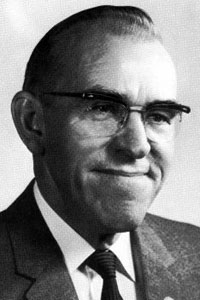A.A. Kroeker was born December 6, 1892 to Abraham and Helena (Wiens) Kroeker on the family homestead in the Winkler area.
This energetic, enthusiastic man contributed a lot to agriculture and indirectly to the people of Manitoba. Not only did he improve farming practices of the day and introduce new crops to the region, but he also improved the attitude and outlook of family, friends and neighbours.
In 1928, after he had devoted his time to teaching and business, he bought a farm in order to allow his family to experience the rural way of life. A short time later the ‘Dirty Thirties’ brought drought, weeds, wind, grasshoppers and low prices to the farming operation. However, Kroeker showed an uncanny ability to overcome these difficulties. The procedures of modern-day farming were not in place at that time, but he soon adopted innovative ways to deal with the tough, complex, negative situations. He was one of the first to successfully use chemical fertilizers in this region, to use corn in the crop rotation process and to stop using the wasteful methods of ‘black summerfallowing.’ Soon others were following his example. Kroeker adapted the University of Wisconsin corn-drying plant to Manitoba’s conditions. This adaptation led to an increase in the development of the corn seed trade throughout Canada. ‘Row-crop’ planting helped produce the next step in the evolution of a more diversified economy in southern Manitoba. Sunflowers, commercial potatoes and sugar beets were added to the list of intensively grown crops. This type of land use led to greater employment opportunities and ultimately to a more prosperous region.
Kroeker was devoted to his family, his church and his community. It was this concern for others that explains his contributions to education, his teaching and practising Christian principles, his attention to the housing needs for senior citizens and his correcting of many problems through philanthropic actions. He will be long remembered for having played such an important role in improving the agricultural scene, the economy of the province and most of all the quality of people’s lives.


